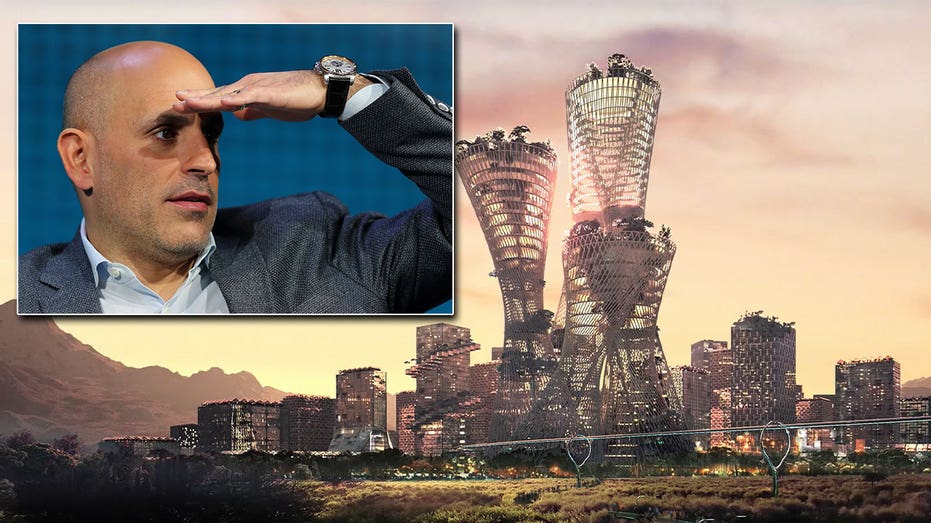Billionaire entrepreneur Marc Lore wants to build nation’s first woke city
Lore last week unveiled plans for his utopia, called Telosa, from the ancient Greek word Telos, meaning 'highest purpose'
'Woke, Inc.' author Vivek Ramaswamy: America needs a ‘cultural cure’
Entrepreneur and ‘Woke, Inc.’ author Vivek Ramaswamy on potential legal arguments against corporations pushing ‘wokeness’ on their employees.
Former Walmart executive and e-commerce billionaire Marc Lore wants to build the world’s first woke city from scratch — somewhere in the US.
Lore last week unveiled plans for his utopia, called Telosa, from the ancient Greek word Telos, meaning "highest purpose."
"The mission of Telosa is to create a more equitable, sustainable future. That’s our North Star," Lore said in a promotional video. "We are going to be the most open, the most fair and the most inclusive city in the world."
WALMART INVESTING NEARLY $1B TO COVER TUITION, BOOK COSTS FOR US EMPLOYEES
Key to the city’s plans is Lore’s economic vision, called "Equitism," in which the land upon which the city is built will be donated to a community endowment.
Residents, in turn, own their homes on the land and are enriched as home values increase, according to the project’s site, and after a period of "hyper-growth," residents can buy the land from the community endowment.
"If you went into the desert where the land was worth nothing, or very little, and you created a foundation that owned the land, and people moved there and tax dollars built infrastructure and we built one of the greatest cities in the world, the foundation could be worth a trillion dollars," Lore told Bloomberg Businessweek.
"And if the foundation’s mission was to take the appreciation of the land and give it back to the citizens in the form of medicine, education, affordable housing, social services: Wow, that’s it!"
The city is meant to take on what Lore views as the United States’ biggest challenge — the rapidly growing wealth gap, which he said "is going to bring down America."
"While the current economic system is a growth engine, it has led to increasing inequality," the project’s website explains. "Equitism is inclusive growth."

Marc Lore, president and CEO of Walmart eCommerce U.S. and former founder and CEO of Jet.com, gestures at the Wall Street Journal Digital Conference in Laguna Beach, California, U.S., October 17, 2017. (REUTERS/Mike Blake -- City Of Telosa / Reuters)
The initial phase of the project, targeted for completion by 2030, would be built to accommodate 50,000 residents across roughly 1,500 acres at a cost of $25 billion, Businessweek reported.
Over 40 years, the city will eventually require $400 billion in funding and grow to house as many as 5 million people across 150,000 acres, the site says.
The project’s planners have yet to commit to a location, but the website identifies Nevada, Utah, Idaho, Arizona, Texas and the Appalachian region as possible sites.
In June, Lore hired Copenhagen-based architectural firm Bjarke Ingels Group to design the city.
GET FOX BUSINESS ON THE GO BY CLICKING HERE
Sleek renderings imagine plenty of space for pedestrians to stroll in the lush metropolis, and include images of planes and other aircrafts that appear to be from Archer Aviation, the electric "air taxi" startup in which Lore is an investor.
Another image on the site shows a skyscraper called Equitism tower that houses elevated water storage, aeroponic farms and an energy-producing roof.
The streets "prioritize bikes and pedestrians," according to the website, and slow-moving self-driving cars share the street.
Lore, who reportedly has a net worth of up to $4 billion, founded Quidsi, a company that owned e-commerce sites including diapers.com, and sold it to Amazon in 2010 for around $545 million.
He left Amazon after two years and founded Jet.com before selling it to Walmart in 2016, joining the retail giant as head of US e-commerce.
The chronic entrepreneur left the company earlier this year to pursue other projects that were unannounced at the time.
He’s since bought a stake in the Minnesota Timberwolves and Lynx, and started a new venture capital firm with Alex Rodriguez called Vision Capital People.
CLICK HERE TO READ MORE ON FOX BUSINESS
But Lore’s not the first mogul to try to build a utopian society. Sarah Moser, an associate professor of geography at Montreal’s McGill University, put his chances of success at roughly zero.
She’s identified about 150 greenfield city-building projects that are backed either by governments or private interests. Not one has hit its population targets, she told Businessweek.
To read more from the New York Post, click here.




















